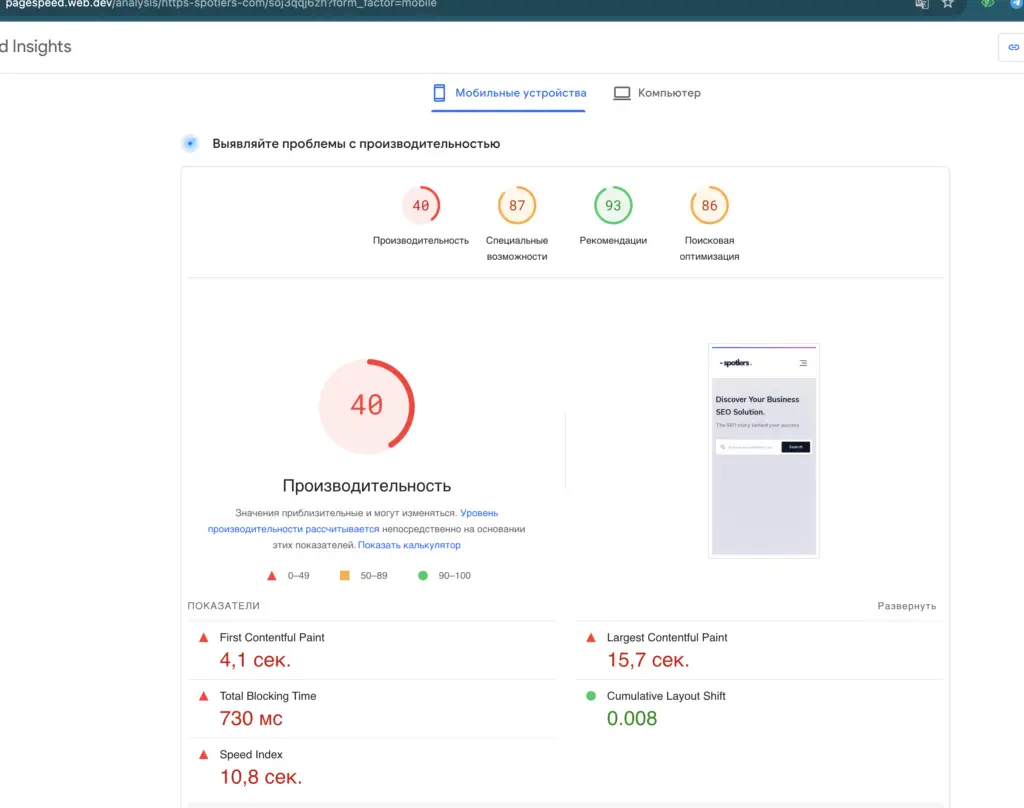
- By spotlers.com
- 03.05.2024
- No Comments
Website loading speed is how it affects your sales

The Internet is now fast enough everywhere, and users are used to websites opening quickly. Google research has shown that more than half of users (53%) close a web page if it takes more than 3 seconds to load. This not only causes negative emotions in visitors, but also leads to an increase in website abandonment. As a result, the site’s position in Google and Yandex search results decreases.
Search engines take into account the loading speed of web pages when evaluating their ranking, and therefore the speed of loading a website plays an important role not only to attract new visitors, but also to retain existing ones. Therefore, among other things, it is important to pay attention to optimizing the loading speed of your websites and online stores.
What is SEO
SEO (search engine optimization) is search engine optimization or a set of measures to improve a website so that it meets the requirements of search engines. A well-optimized website ranks higher in search engine results, more people see it, more visitors come to it, and it sells better.
There is no simple way to bring the site in the top 3 search results, however, requires a lot of constant investment). Search algorithms are not only very complex, but also often change. That is why SEO is a work that must be carried out constantly.
The factors by which sites are evaluated are divided into internal and external.
Internal factors:
- relevancy – how well each page of the site matches the user’s query.
- content quality – design, informativeness.
- usability – the convenience of the site.
The main external factor is the authority of the resource, that is, its citation on the Internet. The more links and transitions from third-party sites, the better.
The site should 100% solve the task of the user in a convenient form.
Website speed and SEO
Google has been taking website loading speed into account when ranking for a very long time – since 2008. In 2015, it became relevant for mobile queries as well. Therefore, slow sites are less likely to get to the top of the search.
If users leave the site quickly, the search engine may decide that the content on it is bad. This will affect the ranking.
Slow mobile sites are less likely to get to the top because search engines try to encourage mobile optimization.
If a site loads quickly, users spend more time on it and look at more pages, which is logical. This has a positive impact on SEO and can improve a site’s ranking.
Google explains that people are less likely to use their search if slow sites appear in the results. This has forced the company to adjust its ranking algorithm to take into account the speed of loading resources.
Search engines benefit from expanding their audience, displaying more ads, and thus increasing revenue. In addition, search engines care about users, counting on their loyalty in return. Therefore, sanctions are imposed for slow loading.
The site should load quickly both on a computer and on mobile devices (they provide at least 50% of traffic today).
What is more important – speed or quality? This is a compromise, and it is solved by technical means. Of course, we cannot forget about the content of the resource. Therefore, SEO-specialists are constantly improving the content and functional parts of the site. But these improvements should not adversely affect the speed. Otherwise, the site will get rejections and “sag” in the search.
These are the conclusions described in the article “The impact of site loading speed on SEO. How to get into the green zone of Google PageSpeed” about the impact of site loading speed on SEO:
- Load speed indicators do not correlate linearly with visibility. That is, it is not particularly reasonable to base your SEO strategy only on site acceleration. And there is no correlation either with the PageSpeed Insight index itself, or with its elements: interaction before the first rendering, before the first action, etc. Both mobile and desktop versions were analyzed.
- If a page has good other metrics, load speed can give it an extra bonus. If the page loses on basic factors, high loading speed will not help it.
- The effect of upload speed on rendition is complex and non-linear. A low correlation index may indicate a more serious connection. To analyze its nature, you will have to put more effort into it.
Indeed, slow sites on the first pages of a search are not that uncommon. After all, speed is only one of the ranking factors. Significant, but by no means the main one. As a rule, market leaders, including online hypermarkets and reputable portals, get to the top of the output. Such sites are often overloaded with content, functionality, advertising. But people, for a number of reasons, are willing to forgive them clumsiness. When people are loyal, search engines also “turn a blind eye” to technical defects and make exceptions for many important companies.
Don’t forget that the speed at which pages open depends on the performance of the user’s device, the quality of the Internet connection and browser settings.
Thus it can be seen that to achieve the highest results in search queries, site loading speed and SEO-optimization should be used comprehensively, and ignoring any of these factors can have a bad effect on the ranking of the site.
Tools for checking site loading speed
To optimize the loading speed of a website, you will need tools that will help you analyze the performance of the web resource. Here are the most commonly used by professional web developers:
PageSpeed Insights
PageSpeed Insights helps you get reports on page load speed on mobile devices and computers. It tells you how to increase this speed by showing how fast a page loads for real users under simulated conditions. Simulations are useful for finding and fixing speed issues, but may not take into account some issues with users’ devices themselves and their internet speed.

WebPage test
WebPage test is a special tool with which you can find users of a web page and estimate the speed based on their location. In this way, you can control the speed of a web page and optimize it based on the geographical location of the users.

Recommendations for speeding up the loading of website pages
Analyzing articles from web developers on the topic of speeding up site loading and the results of testing sites with tools to check their loading speed help to highlight the following recommendations that will help speed up the loading of your resources:
- Ensure fast HTML, CSS and JS crawling – the server must quickly give all the resources needed to form a page, so first you need to speed it up itself.
- Reduce the amount of CSS, HTML and JavaScripts code – some code on a web page is useless. For example, unnecessary spaces, characters or spacing that are irrelevant to the functioning of the page. Thus, you can optimize your code by removing such fragments, which will significantly increase the loading speed of the site. To do this, you can use special programs, such as UGlifyJS, recommended by Google.
- Disable all unused resources – about 30% of sites load slowly due to the connection of all sorts of libraries, scripts, plugins, etc. that slow down rendering. Often sites don’t even use them.
- Optimize data storage – Web browsers store a lot of information, including instructions, images, files, Java scripts, etc. Storage helps the browser avoid loading repetitive pages multiple times.
- Use Content Distribution Networks (CDNs) – These are content delivery networks, which are a network of servers used to distribute the load of content being sent. With this technology, your website will be replicated across multiple data centers and users can access it faster.
- Use optimized images – Images make up a huge portion of internet traffic. According to HTTP Archive, 60% of web page volume is graphics in JPEG, PNG and GIF formats, so choosing the optimal image storage format is very important. Nowadays webp and avif are becoming more and more popular image storage formats.
Deferred (lazy load) loading of images – allows you to postpone the loading of images that are not on the screen (the user to them not yet dolistal). This reduces page load time, as images are loaded only when they appear on the device screen.
This is by no means a complete list of methods for optimizing the loading speed of a website. However, by following these rules, you can achieve very good results. Our SEO specialists can help you with this.
Conclusion
Web resources and requirements are constantly changing, and users expect ever faster and more responsive sites. Therefore, it is important to understand that optimization is an ongoing process that should be part of the daily practice of website development and maintenance. And, of course, in the pursuit of speed, we should not forget that content is created primarily for people, not for search engine robots.










